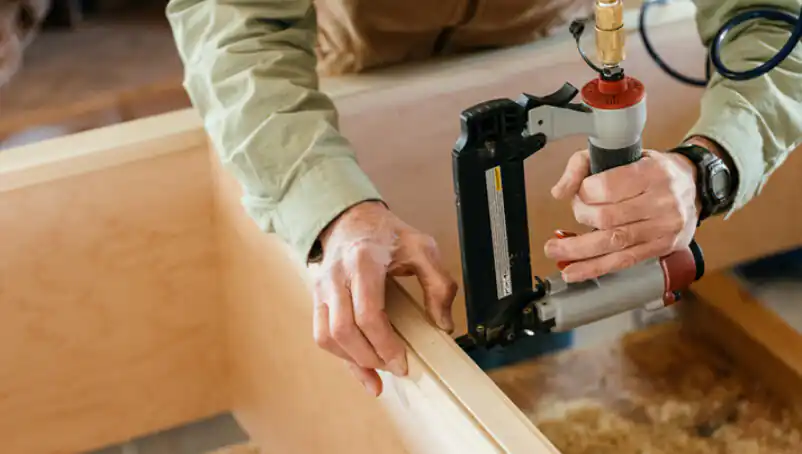Rough carpentry vs. finish carpentry: What’s the difference?
The terms can vary and overlap, but there are generally two carpentry types: rough carpentry (sometimes called “general carpentry” or “framing”) and finish carpentry (sometimes called “trim carpentry”).
Rough carpentry refers to the structural work that creates a building’s skeleton. That includes framing, roofing and formwork. A rough carpenter’s work isn’t visible when a building is complete, so the focus is on strength and durability, not aesthetics.
Finish carpentry usually refers to everything that comes after rough carpentry: flooring, staircase and trims. Because finish carpentry will be visible, the emphasis is on looks and neatness.
These two types of carpentry complement each other: rough carpenters start and finish carpenters — you guessed it — finish the job.
There are many specialties within each type of carpentry, and they often intersect. It’s common for professional carpenters to have skills across multiple types of carpentry so don’t feel like you need to choose only one or the other when developing a niche.
Carpentry business ideas for rough carpenters
Rough carpenters work to build out the bones of a building, both temporary and permanent. Entrepreneurs need to have experience with many different tools and solid planning, mathematical and time management skills.
Framing carpenter
Framing is the main task of rough carpentry — that’s why some people simply call rough carpenters “framers.” A framer is one of the first people on any construction site, and has one of the most important jobs there.
A framing carpenter constructs a building’s framework: the structure of its walls, floors and roofs. The framer must ensure the building is being constructed according to the blueprint and is structurally sound.
No construction project can go forward without a framer, and they’re currently in very high demand. Data from the National Association of Home Builders shows that in 2021, 94% of US builders reported a shortage of framing carpenter subcontractors — more than almost any other trade or specialization.
Formworker
A formworker, also known as a formwork carpenter, builds temporary structures called forms to mold concrete or support a building before it can support itself. Forms are commonly made of wood, though they can also be made of fiberglass, plastic or steel.
Some formwork carpenters specialize in building foundations for residential construction. But formworkers also play a big role in large structures like highways, bridges and tall buildings. Many formwork carpenters do both.
Formworking requires specialized training — which you can get through an organization like the United Brotherhood of Carpenters.
Roofing carpenter
A roofer or roofing contractor may refer to someone who installs and maintains roofing materials like shingles, tiles and metal sheets. But it can also refer to a roofing carpenter, a type of framing carpenter who builds structures that support roofs and installs roofing material.
Roof framing has specializations. Some carpenters focus on “stick framing,” which refers to building rafters, which gives a building a vaulted ceiling or an attic.
Today, most residential home roofs are built using trusses, which are often prefabricated and more cost-effective. Carpenters specializing in building trusses can build them for roofs and floors.
Joister
The term joister refers to a rough carpenter who lays joists: the horizontal members that support a building’s floors.
A joister’s job is crucial for a building’s structural integrity. It requires special expertise, which is why some carpenters specialize in this carpentry niche. Though joisters are rough carpenters, many joisters also work on wooden floor finishes.
Drywall finisher
Drywall finishers, sometimes called drywallers, measure, cut and install the coverings that go over a building’s frame. They also seal and sand it to prepare it for painting.
It takes skill to leave a drywall surface perfectly flat, so reliable drywall finishers are highly sought after by home builders. Drywalling doesn’t require a specific license, but there are drywall apprenticeships that can help you master this rewarding carpentry niche.
Carpentry business ideas for finish carpenters
A finish carpenter, also known as a trim carpenter, works on a building after all the “rough” structural work is done. They install things like door and window trims, flooring, staircases, baseboards, cabinets and shelves.
Many finish carpenters choose a carpentry specialty or two to work in, allowing them to command high prices from customers looking for the highest quality finishes for their homes.
Floor installer
Floor installers, or floor coverers, install and repair flooring from wood to carpeting to laminates. Flooring materials like tile and solid hardwood take special skill and tools to cut, sand and finish, which means there’s always a demand for carpenters who can tackle these jobs.
The right training program can help you become a professional floor installer. Some highly-regarded options include an apprenticeship with the National Wood Flooring Association, the United Brotherhood of Carpenters’ flooring curriculum and training courses from INSTALL.
Stairs carpenter
In modern residential construction, many staircases are pre-fabricated. But there are many homes where a standard set of stairs won’t fit — and that’s where a stairs carpenter comes in.
Building a custom set of stairs is one of the hardest jobs in finish carpentry. Stairs have to be built precisely to feel “right,” so a professional stairs carpenter must be able to turn a roughly framed staircase into a perfect final product.
There are few expert stairs builders, so carpenters who specialize in this carpentry niche can demand high fees. The Stairbuilders and Manufacturers (SMA) offers a Stair Academy that can help improve your skills.
Millworker
A millworker is a carpenter who creates the wood materials used in finish carpentry, like doors, windows, molding, trim, stairways and cabinets. Millworkers typically work in a lumber mill rather than on a construction site.
Some millworkers call themselves cabinetmakers. The term cabinetmaking often implies a higher degree of custom detail, using precise woodworking skills.
Many finish carpenters also work as millworkers or cabinetmakers, as their skills and expertise often overlap. In many states, millworkers are required to hold carpentry licenses and show proof of carpenter’s insurance.
Miscellaneous carpentry business ideas
Many carpenters are skilled in rough and finish carpentry and find niches that use both sets of skills. Here are some niches that focus on a particular skill or service.
- Deck building. This kind of carpentry specializes in building and repairing outdoor decks.
- Fencing. Fencing carpenters and contractors specialize in building and installing fences and gates.
- Restoration. Carpenters who specialize in restoration might focus on preserving aging structures and modernizing historic buildings to meet current standards for accessibility or energy efficiency.
- Ship carpentry. Shipwrights or ship carpenters take their skills to the maritime industry, building and repairing boats.
- Stage carpentry. Stage carpentry involves building sets and stage elements for theater productions.
Woodworking business ideas
While carpentry tends to focus on the structure and installation aspect of building, woodworking focuses more on the artistic side of creating things out of wood. You might consider creating a profitable woodworking business if you have a creative flair.
Popular wood products might include:
- Furniture making. There’s no shortage of wooden furniture items, including dining tables and chairs, display cases, side tables and nightstands, benches, bureaus and dressers, bed frames and more.
- Building custom furniture or built-ins. This might include built-in bookshelves, entertainment centers, wall units or office spaces.
- Kitchen tools. You can create cutting boards, wooden spoons and utensils, hardwood chopsticks, wooden dishware and bowls.
- Decorative items. These are wood items often used in home decor: photo frames, picture frames, wall art, storage boxes, jewelry boxes, business card holders, candle holders and more.
Launching your carpentry business
While carpentry is a diverse trade, solid carpentry skills are transferable across many fields. Likewise, solid small business skills — such as accounting and marketing — will help you succeed, no matter what kind of carpentry specialization you choose.
A good carpentry business should have these fundamentals:
- A business plan. Writing a business plan will help you develop a target market, guide you as your business grows and help you get loans to finance your business.
- A marketing strategy: Carpentry is a competitive field, so a good carpentry marketing strategy helps build a steady pipeline of work to help your business grow.
- Proper licenses and permits. The requirements can vary, so make sure you have the right carpentry licenses and permits to operate in your area.
- Business insurance. Carpentry is a risky business, so carpenters insurance is a must-have. Having insurance lets you focus on your work, knowing that you’re covered even if something unexpected happens.






